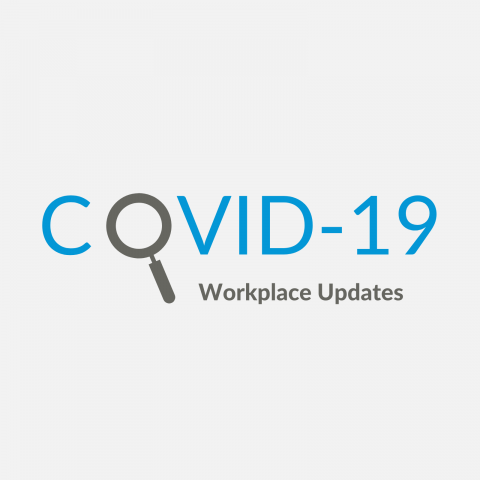COVID-19 Updates | Weekly Workplace Recap from December 4 to December 10, 2020

Sign up for COVID-19 EMAIL Updates
If you receive our newsletter,
you're already signed up!
Below are the key announcements from the Federal, Ontario, Manitoba, Saskatchewan, Alberta and BC governments that touch on workplace issues from December 4 to December 10, 2020.
Federal
Expands Canada Emergency Business Account (CEBA) Loans
As of Friday, December 4, eligible businesses can access a new, second CEBA loan of up to $20,000, in addition to the $40,000 that was initially available. Half of the loan, up to $10,000, will be forgivable if the loan is repaid by December 31, 2022.
The application deadline for CEBA has also been extended to March 31, 2021. To apply, eligible businesses and not-for-profits should contact the financial institution that provided their initial CEBA loan.
For more information, check out this news release.
Ontario
Ensures WSIB Premiums and Compensation will Remain Stable
Ontario is protecting workers and employers during COVID-19 by proposing Bill 238, Workplace Safety and Insurance Amendment Act, 2020.
Introduced on Monday, December 8, the legislation, if passed, will protect employers from an unexpected increase in Workplace Safety and Insurance Board (WSIB) premiums, while maintaining an increase to the maximum earnings cap for worker benefits.
The COVID-19 pandemic has raised the unemployment rate among lower wage workers, including those in the retail, hospitality and the service sector, resulting in an increase in the average industrial wage (AIG) of Ontario workers by 7.8%, compared to an average increase of 2-3%.
Bill 238 would limit the impact the increase the AIG has on WSIB premiums to 2%, ensuring that struggling business owners aren't subject to sudden undue costs during the pandemic.
For more information, check out this news release.
Manitoba
Expands Manitoba Bridge Grant Program to Home-Based Businesses
The Manitoba government is expanding its Manitoba Bridge Grant program and extending the deadline to protect more small businesses impacted by current public health restrictions.
The first stream of the grant provides $5,000 upfront to businesses, not-for-profits and charities ordered to temporarily cease operations or close locations by COVID-19 public health orders in effect on November 12. The initial intake only included businesses with physical storefronts, such as restaurants, bars, and organizations such as charities and not-for-profits.
The second stream of the grant program, which opened yesterday, December 9, will provide up to $5,000 in support to home-based businesses ineligible for the first round. This may include, but not be limited to, event planners, photographers, artists and tradespeople who do not operate a retail location.
The deadline for applications for both streams of the Manitoba Bridge Grant is December 31.
Apply for the Manitoba Bridge Grant.
Saskatchewan
Lowers Tax Rates for Small Businesses to Help Economic Recovery
Saskatchewan has introduced legislation to temporarily reduce the tax rate for small businesses over the next three years to help them recover from the pandemic and enable them to retain and hire more workers.
Under this initiative:
- Saskatchewan’s small business corporate income tax rate drops from 2% to zero effective October 1, 2020.
- Beginning July 1, 2022, the small business tax rate will move to 1%.
- On July 1, 2023, the small business tax rate will return to 2%.
- The amount which small businesses can earn at the small business tax rate will remain at $600,000—the highest threshold in Canada.
These tax reductions will benefit about 31,000 incorporated Saskatchewan small businesses, saving them more than $189 million in provincial taxes over the next three years—for an average savings of more than $6,100 per Saskatchewan small business.
For more information, check out this news release.
Alberta
Expands & Increases the Small and Medium Enterprise Relaunch Grant
The Small and Medium Enterprise Relaunch Grant offers financial assistance to Alberta businesses impacted by the COVID-19 pandemic to offset a portion of their relaunch costs.
Up to 15,000 more businesses may be eligible for funding now that a lower threshold and increased grant amount has been announced.
Starting early the week of December 14, job creators who have experienced a 30% revenue loss due to the COVID-19 pandemic will qualify for the program, lowering the threshold from the existing 40% revenue loss requirement. This 30% threshold will be available to impacted businesses retroactive to March.
Alberta businesses affected by the public health orders in effect from November 6, 2020 and later will also be eligible to apply for a second payment through the program.
Job creators that meet the program’s eligibility criteria will be able to apply for 15% of their pre-COVID-19 monthly revenue up to:
- a maximum of $5,000 in funding for their first payment, and
- a maximum of $15,000 for their second payment.
Visit the program web page for eligibility criteria and application process details.
Mandatory Closures & Work-from-Home Measures effective December 13
New and expanded province-wide, mandatory measures came into effect for Alberta this Tuesday, December 8 for social gatherings and mandatory masking.
The following measures come into effect at 12:01am, Sunday, December 13:
Work from Home
- Mandatory work-from-home measures will be implemented, unless the employer determines that work requires a physical presence for operational effectiveness.
Closures
- Restaurants, pubs, bars, lounges and cafes will be closed to in-person service.
- Only takeout, curbside pickup and delivery services are permitted.
- Casinos, bingo halls, gaming entertainment centres, racing entertainment centres, horse tracks, raceways, bowling alleys, pool halls, legions, and private clubs will be closed.
- Recreational facilities – fitness centres, recreation centres, pools, spas, gyms, studios, day and overnight camps, indoor rinks and arenas – will be closed.
- Outdoor recreation is permitted, but facilities with indoor spaces except for washrooms will be closed.
- Entertainment businesses and entities – libraries, science centres, interpretive centres, museums, galleries, amusement parks and water parks – will be closed.
- Hotels may remain open but must follow restrictions – no spas, pools or in-person dining. Room services only.
- Personal and wellness services, including hair salons, nail salons, massage, tattoos, and piercing, will be closed.
Retail
- Retail services must reduce customer capacity 15% of fire code occupancy, with a minimum of five customers permitted.
- Curbside pickup, delivery and online services are encouraged.
- Shopping malls will be limited to 15% of fire code occupancy.
See a full list of restrictions in this news release.
British Columbia
$1,000 B.C. Recovery Benefit Applications Begin December 18
The BC Recovery Benefit is a one-time direct deposit payment for eligible families, single parents or individuals. The benefit provides:
- $1,000 for families with incomes under $125,000. Families earning up to $175,000 will qualify for a reduced benefit amount. Single-parent families also qualify for these benefit amounts.
- $500 for single people earning less than $62,500. Single people earning up to $87,500 will qualify for a reduced benefit amount.
Benefit eligibility is based on net income from your 2019 tax return. You must apply to receive the benefit.
Applications open Friday, December 18, 2020. Visit the BC Recovery Benefit webpage for more information.
Sign up for COVID-19 EMAIL Updates
If you receive our newsletter,
you're already signed up!


